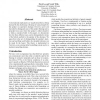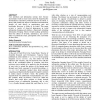1122 search results - page 141 / 225 » Modelling Cooperative Multi-agent Systems |
73
Voted
CORR
1998
Springer
15 years 9 days ago
1998
Springer
Conversational implicatures are usually described as being licensed by the disobeying or flouting of some principle by the speaker in cooperative dialogue. However, such work has...
113
Voted
CSCW
2006
ACM
15 years 6 months ago
2006
ACM
Representations are at work in IT technology. As plans of and for work, they enable cooperation, coordination, accountability and control, which have to be balanced off against ea...
79
Voted
WEBNET
2001
15 years 2 months ago
2001
: Teleworking enables a more flexible scheduling of working time and places of work on the way to the modern information society. The rapid development of cooperative application s...
107
Voted
CHI
2009
ACM
16 years 1 months ago
2009
ACM
User interfaces and information systems have become increasingly social in recent years, aimed at supporting the decentralized, cooperative production and use of content. A theory...
107
Voted
JANCL
2007
15 years 16 days ago
2007
Qualitative coalitional games (QCGs) were introduced as abstract formal models of goal-oriented cooperative systems. A QCG is a game in which each agent is assumed to have some goa...



